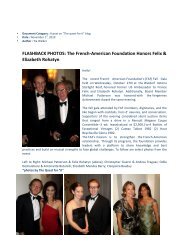Lille, a European Cultural Capital for 2004, offered a unique opportunity to see howregional and European funds are used, what their added-value, potential conflicts,and competition with central authorities may be. The delegation appreciated exploringthese two different contexts and came back concluding that the oft-used phrase Pariset le désert français does not hold true!COURANTS 2004: EDUCATION ARTISTIQUELe thème du programme Courants en 2004 a été l’éducation artistique comme moyend’offrir la culture à des publics divers, enfants, adultes, étudiants et public du troisièmeâge, aussi bien qu’à des groupes marginalisés tant économiquement que culturellement.Le voyage d’étude des experts français aux Etats-Unis a eu lieu en février. Il a débuté dansla capitale fédérale afin de montrer ce qui a été accompli par des institutions tels que leNational Endowment for the Arts, le Département d’Etat à l’Education, le SmithsonianInstitution, le National Gallery of Art et le Kennedy Center. La délégation s’est ensuite rendueà New York. La ville offre un modèle exemplaire de ce qu’une municipalité peut réussir àmettre sur pied pour promouvoir l’éducation artistique. La ville de New York a été particulièrementactive dans l’établissement d’une coopération entre le Département desAffaires Culturelles et le Département d’Education avec, pour objet, la rédaction d’un programmescolaire général pour les disciplines artistiques. La délégation a aussi visité deshauts lieux de culture et d’histoire tels le Guggenheim, le Lower East Side Tenement Museum,et Lincoln Center. La délégation a voyagé ensuite à San Francisco, connu pour le degré d’innovationdes programmes d’éducation artistique mis en place dans les dernières années.C’était aussi l’occasion d’examiner des programmes locaux rendus possibles par l’immensetravail d’organismes à but non lucratif dans la mise en relation d’artistes et d’écoles.Les Français ont beaucoup aimé leur séjour aux Etats-Unis et en sont revenus avec unepanoplie de projets transatlantiques à mettre sur pied.Au mois de mai, une délégation d’experts américains s’est rendue à Paris et à Lille. EnFrance, la délégation a bénéficié de l’accueil du Département des AffairesInternationales du Ministère de la Culture et de la Maison des Cultures du Monde. AParis, la délégation a eu des rendez-vous avec les Ministères de l’Education Nationaleet de la Culture qui ont présenté les fondements des politiques publiques mises enplace pour les arts dans le milieu éducatif au niveau national. Les participants ont vuaussi des exemples pratiques tels qu’un spectacle de danse au Palais de Chaillot dejeunes du Lycée Racine et des ateliers au Centre Georges Pompidou. Ils ont visité égalementle Louvre et l’Opéra National de Paris où ils ont pu voir comment sont montésles ateliers de chant et de sculpture et comment ces institutionsrépondent aux besoins sociaux.La visite à Lille, la capitale culturelle européenne 2004, afourni une occasion unique de constater comment lesfonds régionaux et européens sont appropriés, quelle estleur valeur ajoutée et quels sont les conflits et la compétitionéventuelle avec les autorités centrales.La délégation a beaucoup apprécié l’opportunité d’explorerces deux contextes différents et en est revenueconcluant que l’expression souvent entendue Paris et ledésert français n’est pas un reflet de la réalité !2004Marie-Frédérique BergeaudDépartement des affairesinternationalesMinistère de la culture et de la communicationClaire CarpentierDirector for Cultural ActivitiesCité des Sciences à la VilletteSavine FaupinHead CuratorMusée d’Art Contemporainde Villeneuve d’AscqAgnès de JacquelotHead of Educational Eventsand Young Audiencesl’Opéra National de ParisJean-Marc LauretHead of Education and Artistic ProgramsMinistère de la culture et de la communicationMartine LeguenHead of Studies andCurriculum DepartmentMinistère de l’EducationFrédérique LeseurAssistant Director for Educationaland Cultural ProgramsMusée du LouvreHayet ZeggarHead of Educationand Audience DevelopmentCentre National d’art et de CultureGeorges PompidouFront Row: Hayet Zeggar, Savine Faupin,Agnés de Jaquelot, Frédérique Leseur,Martine Leguen, Marie-Frédérique Bergeaud andCarina Van Vliet.Back row: Claire Carpentier and Jean-Marc LauretWWW.FRENCHAMERICAN.ORG23
“DILLON LECTUREI have always found in my dealings with the <strong>French</strong>, that if we make aneffort to understand their point of view, we usually find that they are beingfully as reasonable as we, and that each side profits from understandingthe position of the other.FAF ANNUAL REPORT 2003-2004The <strong>French</strong>-<strong>American</strong> <strong>Foundation</strong> joined the Society ofthe Cincinnati on March 11, 2004, to hold the first of thenew series of Douglas Dillon Lectures. AmbassadorDillon was a leading member of both organizations and,indeed, was a founding member of the <strong>Foundation</strong>. Theevent was held at the Anderson House, the elegant headquartersof the Society of the Cincinnati in Washington,DC. About 150 people were in attendance, including anumber of the <strong>Foundation</strong>’s directors and past programparticipants.While Senator Chuck Hagel of Nebraska, a member ofthe Congressional <strong>French</strong> Caucus, had agreed to give theinaugural lecture, a series of last minute Senate votes preventedhim from leaving his post on Capitol Hill. The<strong>Foundation</strong> will always be grateful to <strong>French</strong>Ambassador Jean-David Levitte, who volunteered tospeak in the Senator’s place. Without benefit of preparationor notes, he gave an admirable lecture that traced theorigins of <strong>French</strong>-<strong>American</strong> policy disagreements andemphasized the many positive developments that hadoccurred since. The success of his remarks was such thatall who heard him felt optimistic that such excellent representationof France in the United States would surelylead to closer future cooperation.We tend to dwell on actions they take with which we disagree withoutmaking an effort to understand the reasons for their actions.And we tend to forget those occasions on which there is no disagreement,which, in fact, is the situation most of the time..”La <strong>French</strong>-<strong>American</strong> <strong>Foundation</strong> s’est jointe à la Society ofthe Cincinnati, le 11 mars 2004, pour inaugurer une sériede conférences en l’honneur de Douglas Dillon.L’ambassadeur Dillon était un membre éminent desdeux organisations, et un fondateur de la <strong>French</strong>-<strong>American</strong> <strong>Foundation</strong>. Le dîner d’inauguration a eu lieudans la Anderson House, la gracieuse demeure qui abritela Society of the Cincinnati à Washington, DC. De nombreuxdirecteurs de la fondation et des participants de nosprecédents programmes étaient parmi les 150 invités.Alors que le sénateur du Nebraska, Chuck Hagel,membre du Congressional <strong>French</strong> Caucus, avait accepté deprononcer le discours d’inauguration, il a été retenu pardes votes de dernière minute au Sénat. La fondation seradonc éternellement reconnaissante à l’ambassadeurJean-David Levitte de s’être porté volontaire pourprononcer un discours en son absence. Sans préparationni notes, M. Levitte a retracé les désaccords politiquesentre la France et les Etats-Unis, tout en précisant leursorigines, et en soulignant les développement positifsdepuis. Le succès de son discours a été tel que les invitésont affirmé avec optimisme que, étant donné l’excellentequalité de la représentation de la France aux Etats-Unis,les relations entre les deux pays ne sauraient que tendrevers une meilleure coopération.24




